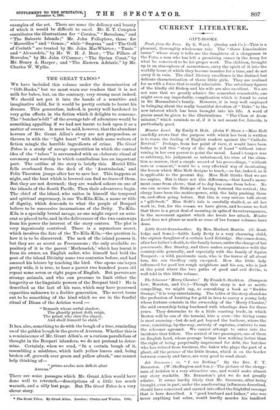THE GREAT TABOO.*
WE have included this volume under the denomination of " Gift-Books," but we must warn our readers that it is not milk for babes, but, on the contrary, very strong meat indeed. We should not put it into the hands of a sensitive and imaginative child, for it would be pretty certain to haunt his dreams. This generation, indeed, is pretty well hardened to very grim effects in the fiction which it delights to consume. The " butcher's-bill " of the average tale of adventure would be something appalling if we had not learnt to look upon it as a matter of course. It must be said, however, that the abundant horrors of Mr. Grant Allen's story are not purposeless, or thrown in with the " light heart " with which some writers of fiction mingle the horrible ingredients of crime. The Great Taboo is a study of savage superstition in which the central idea of the " taboo " is surrounded with an elaborate ritual of ceremony and worship in which cannibalism has an important part. The outline of the story is briefly this. Muriel Ellis falls overboard from the deck of the Australasian,' and Felix Thurston jumps after her to save her. This happens at night, and the boat which is lowered can find no trace of them. But they are not drowned; they are washed ashore on one of the islands of the South Pacific. Then their adventures begin. The chief of the island, who unites in himself the temporal and spiritual supremacy, is one Tu-Kila-Kila, a name or title of dignity, which descends to what the people of Boupari believe to be successive incarnations of the Deity. Tu-Kila- Kila is a specially brutal savage, as one might expect an auto- crat so placed to be, and in the deliverance of the two castaways from his power the interest of the story centres. The plot is very ingeniously contrived. There is a mysterious secret, which involves the fate of the Tu-Kila-Kila,—the question is, how it is to be discovered. The meh of the island possess it, but they are as secret as Freemasons ; the only available re- pository of it is the parrot Methuselah,' which has learnt it from its owner, an English sailor, who himself had held the post of the island Divinity some two centuries before, and had amused his leisure by teaching the bird. One opens one's eyes pretty wide, it is true, to hear a parrot two hundred years old repeat some seven or eight pages of English. But parrots are strange animals, and who can presume to limit either the longevity or the linguistic powers of the Boupari bird ? He is described as the last of his race, which may have possessed capacities unknown to a feebler generation. The secret turns out to be something of the kind which we see in the fearful ritual of Diana of the Arician wood :— "Beneath whose awful shadow, The ghastly priest doth reign,
The priest who slew the slayer, And shall himself be slain."
It has, also, something to do with the bough of a tree, reminding us of the golden bough in the grove of Avernus. Whether this is a reminiscence of Mr. Grant Allen's, or a curious parallelism of thought in the Boupari islanders, we do not pretend to deter- mine. Certainly, when we read, "In a certain bough of it, resembling a mistletoe, which bath yellow leaves and, being broken off, groweth ever green and yellow afresh," one cannot help thinking of- " primo avolso non deficit alter Aureus."
There are some passages which Mr. Grant Allen would have done well to retrench,—descriptions of a little too much warmth, and a silly last page. But The Great Taboo is a very clever story.
• The Great Taboo. By Grant Allen. London Obatto and Windue. 1890.






















































 Previous page
Previous page